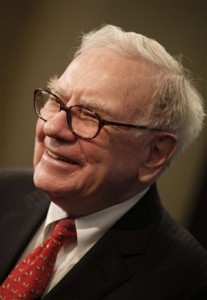 _
_ ![]() Tweet I spoke with two of the Wall Street protesters this morning. We discussed credit unions, other cooperative ventures, Buckminster Fuller’s ideas, capitalism, and productivity. (“A 4-day work week,” Fuller was quoted as saying, “would give us time to enjoy the wealth we create.”) We didn’t talk about Warren Buffett or President Obama, but it seems that both would agree with the protesters’ sentiments, as I do, that our financial system “favors the rich and powerful at the expense of ordinary citizens.” (The protests and the protesters’ motives were described here by Colin Moynihan in the New York Times, Sept. 17, 2011.) The protests are also covered by Think Progress, here.
Tweet I spoke with two of the Wall Street protesters this morning. We discussed credit unions, other cooperative ventures, Buckminster Fuller’s ideas, capitalism, and productivity. (“A 4-day work week,” Fuller was quoted as saying, “would give us time to enjoy the wealth we create.”) We didn’t talk about Warren Buffett or President Obama, but it seems that both would agree with the protesters’ sentiments, as I do, that our financial system “favors the rich and powerful at the expense of ordinary citizens.” (The protests and the protesters’ motives were described here by Colin Moynihan in the New York Times, Sept. 17, 2011.) The protests are also covered by Think Progress, here.
Buffett, in “Stop Coddling the Super-Rich“, published in the NY Times, said
I paid … only 17.4 percent of my taxable income — and that’s actually a lower percentage than was paid by any of the other 20 people in our office. Their tax burdens ranged from 33 percent to 41 percent and averaged 36 percent.
If you make money with money, as some of my super-rich friends do, your percentage may be a bit lower than mine. But if you earn money from a job, your percentage will surely exceed mine — most likely by a lot.
Obama’s initiative is explained on White House . gov and Talking Points Memo, and by Obama in recent days, “It’s not class warfare,” he said, “it’s math” and “If it’s class warfare,” he said in Ohio and Kentucky, while discussing an old bridge between southwestern Ohio and Kentucky that needs to be renovated, “I’m a warrior for the Middle Class.”
Move On has a petition here, saying, “I agree with Buffett – and Obama.”
Despite the evidence, from the 2001 to the present, that cutting taxes on rich people does not create jobs, Charles Gasparino, in the New York Post, a Rupert “We-hack-cell-phones-for-fun-and-profit” Murdoch product, said, here, “taxing the rich will destroy jobs.”
Gasparino is clearly wrong. And Buffett and Obama are clearly correct. Rich people can afford to pay higher taxes, and asking them to pay 17.4% while others, who need to spend a much higher percentage of their income on food, clothes, and housing, pay 33% to 41% does not seem fair.
But the question is “What do we do with the money?” Buffett has also said that he would never have made the money he made had he not been born in the United States, and had he not gone to Columbia University and studied “Value Investing.” He basically argues that the cultural climate and economic systems in the United States enabled him to become wealthy, that this is a good thing, and others deserve the same opportunities. “We must plan for the future and invest in infrastructure. And the wealthy should pay their fair share. ”
Tax policy must be linked to fiscal policy. What we are doing today, Obama, Buffett, and the protesters would say, is using tax policy to make rich people more rich. They would argue, and I would agree, we should use tax policy to develop infrastructure. One idea is to build a 40 kilowatt photovoltaic solar array on each of the 92,000 public schools in the United States. Solar only generates power during the day; schools need most of their power during the day. This would use tax revenues to pay for infrastructure upgrade – and tax revenues pay public schools electric bills. PV Solar systems provide energy without pollution, without toxic wastes, without greenhouse gases. And in the event of an emergency, if disconnected from the grid, we would have a network of 92,000 local emergency shelters with power during the day, when the sun is shining.
Marked cards and a stacked deck are great when you’re doing card tricks. But don’t play poker against a cheater using them.